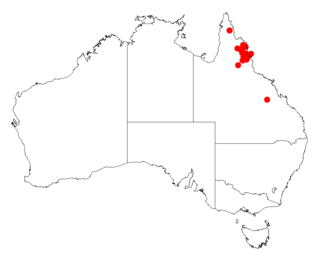
Acacia chrysochaeta is a shrub belonging to the genus Acacia and the subgenus Juliflorae that is endemic to a small area of north western Australia.

Acacia drepanocarpa is a shrub belonging to the genus Acacia and the subgenus Juliflorae native to northern Australia.

Acacia gonoclada, also known as ganambureng, is a tree or shrub belonging to the genus Acacia and the subgenus Juliflorae that is endemic to northern Australia.

Acacia laccata is a shrub belonging to the genus Acacia and the subgenus Juliflorae that is endemic to northern Australia.

Acacia lirellata is a shrub belonging to the genus Acacia and the subgenus Juliflorae that is endemic to south western Australia.

Acacia multispicata, commonly known as spiked wattle, is a shrub belonging to the genus Acacia and the subgenus Juliflorae that is endemic to south western Australia.

Acacia oncinocarpa is a shrub or tree belonging to the genus Acacia and the subgenus Juliflorae that is endemic to northern Australia.

Acacia ptychophylla is a shrub belonging to the genus Acacia and the subgenus Juliflorae the is endemic to arid areas of north western Australia.

Acacia stigmatophylla, also known as djulurd, is a shrub belonging to the genus Acacia and the subgenus Juliflorae the is endemic to northern parts of Western Australia.

Acacia stipuligera is a tree or shrub belonging to the genus Acacia and the subgenus Juliflorae. It is native to arid and tropical parts of northern Australia.

Acacia tetraneura is a shrub belonging to the genus Acacia and the subgenus Juliflorae that is endemic to western Australia.

Acacia yorkrakinensis, also known as soft-leaf wodjil, is a shrub belonging to the genus Acacia and the subgenus Juliflorae that is native to Western Australia.

Acacia abbreviata is a species of flowering plant in the family Fabaceae and is endemic to arid parts of northern Australia. It is a spreading, glabrous, resinous shrub with linear to narrowly oblong phyllodes, spike of golden flowers, and linear to lance-shaped pods.

Acacia pedina is a tree or shrub belonging to the genus Acacia and the subgenus Phyllodineae native to eastern Australia.

Acacia rivalis, commonly known as silver wattle or creek wattle, is a shrub or tree belonging to the genus Acacia and the subgenus Phyllodineae native to southern Australia.

Acacia siculiformis, commonly known as dagger wattle, is a shrub belonging to the genus Acacia and the subgenus Phyllodineae native to south eastern Australia.

Acacia cretata is a shrub or tree belonging to the genus Acacia and the subgenus Juliflorae that is native to north eastern Australia.

Acacia curranii, also known as curly-bark wattle, is a shrub belonging to the genus Acacia and the subgenus Juliflorae that is native to north eastern Australia. It is listed as vulnerable under the Environment Protection and Biodiversity Conservation Act 1999.

Acacia guymeri is a shrub belonging to the genus Acacia and the subgenus Juliflorae that is native to north eastern Australia. It was listed as vulnerable according to the Environment Protection and Biodiversity Conservation Act 1999 but was delisted in 2013. It is still listed as Vulnerable according to the Nature Conservation Act 1992 in Queensland.

Acacia meiosperma is a shrub or tree belonging to the genus Acacia and the subgenus Juliflorae that is native to north eastern Australia.




















